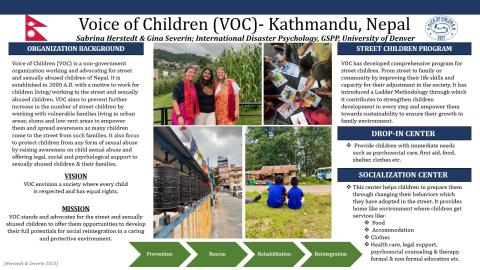Public Good Celebration
Thank you for joining us at the second annual Public Good Celebration!
Hosted by the Office for Public Good Strategy and Research, this year's event celebrated DU's 2024 Carnegie Community Engagement Classification and university and community partners whose collaborative work advances the public good. We are beyond thrilled to be one of 40 colleges and universities to receive the 2024 Carnegie Community Engagement Classification, joining 368 institutions currently recognized by this classification. To learn more about this recognition, we invite you to read DU Newsroom's story, Renewal of Carnegie Classification Renewal Spotlights Deep Commitment to Community Partnerships, and the Provost's letter.
Above all, we want to express our heartfelt appreciation for the dedication and hard work of faculty, staff, students, and community partners. It is through your efforts that this great achievement has been made possible.
Missed the celebration? You can now check out the full video and highlights reel below:
Office for Public Good Programs
- Center for Community Engagement to advance Scholarship & Learning
- Center for Sustainability
- PLP Leadership Studies Program
- CWC Leadership Scholars Program
- Living and Learning Communities (LLCs)
- Equity in Science, Technology, Engineering, and Mathematics (E-STEM) Program
- Signature Work at DU
- Strategic Health Initiative
Featured Works
To recognize the collaborative work being done at DU, a call was put out inviting faculty, staff, and students to submit their public good work for the 2024 Public Good Celebration. Although the projects below showcase just a fraction of the amazing work being done, we were thrilled to feature them at the event.
Posters & Creative Works
----
-
1. A Leer Más Cuentos — Manuel Calvillo de la Garza
Manuel Calvillo de la Garza, Graduate Student, Department of English, College of Arts, Humanities, and Social Sciences
A Leer Más Cuentos — Project website
A Leer Más Cuentos is an online site where stories are translated from English into modern Spanish versions in which the rich variety of Latino regionalisms, tones, syntaxes, and references are conserved. Through collaboration with DU, Manuel worked with the Denver Public Library to bring classic stories translated from English into a contemporary Spanish to the Spanish-speaking communities in Denver and online. The translation of classic fiction stories from English into Spanish makes these timeless works more accessible to Spanish-speaking community members who may not have fluency in English. By broadening the availability of literature in their native language, we foster a deeper appreciation for literature and encourage reading among diverse populations. Through this collaboration, A Leer Más Cuentos was able to restart after a year of inactivity, and hosted four live readings at the Denver Public Library.
Connect further with Manuel's work: @aleermascuentos and @manucalvi (All social media)
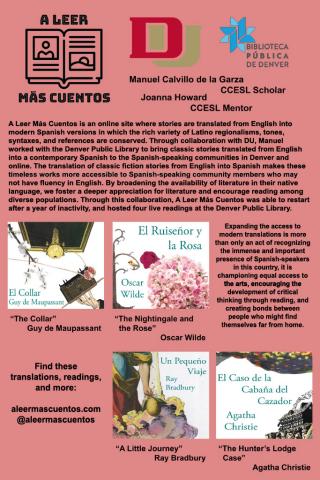
-
2. Black Catholic Liturgical Renewal — Roger Holland
Roger Holland, Faculty, Lamont School of Music
Black Catholic Liturgical Renewal
A new liturgical work, Voice of My People (M. Roger Holland II), will be introduced to various communities. The new work is unique in that it employs multiple genres from within the African diaspora, inclusive of reggaetón, Afro Cuban, African with use of Swahili, and traditional and contemporary Black gospel music. Western classical forms are also employed that have been blackened, that is, infused with African American idioms, specifically harmonic language that is characteristic of African American music, such that the Western forms are adapted and resemble the attributes of African American culture. The goal of the project is to demonstrate that the use of liturgical music that is endemic to the Black community, in all its diversity, is better equipped to facilitate the sung prayer of Black Catholics such that the worship experience is more authentic to that community.
Connect further with Roger's work: @roger.holland.921 (Facebook)
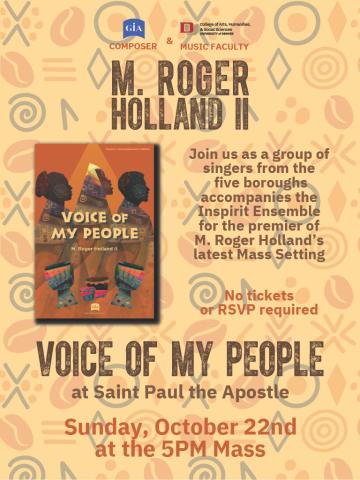
-
3. Brush-E Bot: Your Toothbrushing Companion Bot — Kerstin Haring
Kerstin Haring, Faculty, Department of Computer Science, Ritchie School of Engineering and Computer Science
Brush-E Bot: Your Toothbrushing Companion Bot — DU Build-A-Bot website, Kerstin Haring website
Cavities is a common disease children experience and consistent brushing has been found to reduce the chances of cavities developing. Despite the importance of brushing many caretakers face resistance when trying to instill consistent brushing habits in children. By making brushing time more fun, children can create positive associations with brushing, establishing habits that can last a lifetime. Enter Brush-E Bot! Our robot is designed to make brushing engaging and educational, teaching children how to brush correctly while making the experience as fun as possible.
This is the work of several graduate and undergraduate students from my (Kerstin Haring) lab and they would be presenting the physical robot prototype (if desired in addition to a poster). The robot has been recently accepted into a robot student design competition and the students will present this robot at the largest Human-Robot Interaction conference this year in March.
Connect further with Kerstin's work: @dubuildabot and @robot_dr_kerstinharing (Instagram)
-
4. Creative Design Transforming Community Futures — Alisha Harris
Alisha Harris, Graduate Student, Emergent Digital Practices, College of Arts, Humanities, and Social Sciences
Creative Design Transforming Community Futures — Project website
Original Account Strategies has been at the forefront of driving public good through innovative design and digital empowerment. Our notable collaboration with the Mile High United Way’s United for Business Website Build Initiative showcases our commitment to uplifting local businesses by enhancing their digital presence and marketing strategies. We've successfully empowered over twenty small businesses, fostering significant community growth and development. Our work, deeply rooted in creative and inclusive design principles, not only addresses current community needs but also eagerly anticipates future advancements in digital technology. We’re excited to continue this journey, harnessing emergent digital practices to further contribute to societal well-being and community engagement.
Connect further with Alisha's work: @originalaccountstrategies (Instagram, Facebook, LinkedIn)
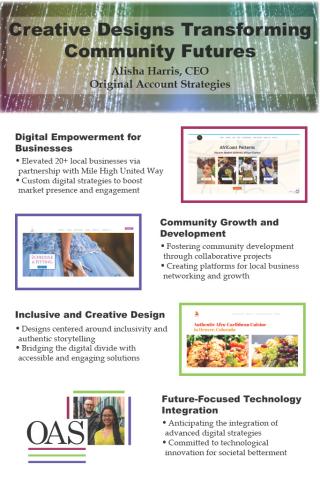
-
5. DU Writers in the Schools — Lydia McCann
Lydia McCann, Undergraduate Student, Department of English, College of Arts, Humanities, and Social Sciences
DU Writers in the Schools — Project website
Writers in the Schools places writer-mentors in K-12 classrooms in order to develop and facilitate creative writing programming. In Winter and Spring of 2023, DU undergraduate and graduate students worked with partner teachers at the Ricks Center to give creative writing lessons to third, sixth, and seventh graders. The DU students also made a print anthology of the children's poetry.
Connect further with Lydia's work: @lydia.mccann
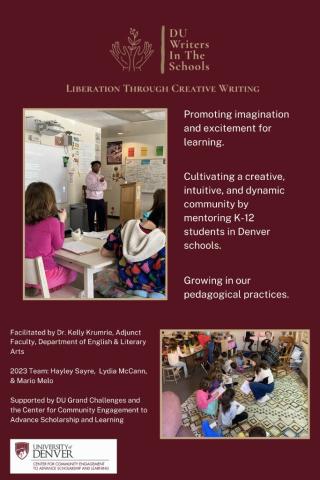
-
6. Falling Through the Cracks: Address Errors in Denver's EOIR Court — Ella Iveslatt
Ella Iveslatt, Undergraduate Student, Josef Korbel School of Global and Public Affairs
Falling Through the Cracks: Address Errors in Denver's EOIR Court
Throughout the process of immigration court, it is imperative that migrants have correct and updated address on file to receive necessary information from the court. This research aims to assess the frequency and types of address errors observed at Denver's Immigration Court, as well as investigate the primary sources and implications of these address errors. This research currently takes the form of a thesis, and is in the process of transforming into a summarized report and data dashboard in partnership with DU's Courtwatch project and pro- and low-bono immigration attorneys across the Denver area; understanding the role of address errors in immigration court, particularly in relation to due process violations and unjust removals of non-citizens, is essential for upholding the rights of respondents in immigration court.
Connect further with Ella's work: @ellaiveslatt
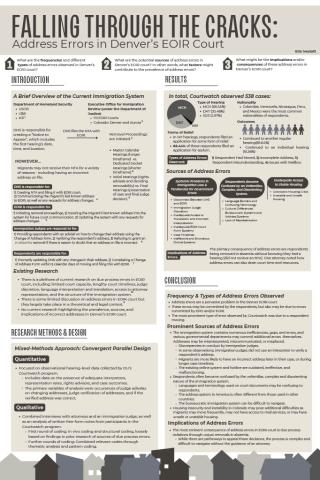
-
7. Growing Home Food Pantry — Ainhoa Calderon
Ainhoa Calderon, Undergraduate Student, College of Arts, Humanities, and Social Sciences
Growing Home Food Pantry
My internship for my Internship in Spanish class was completed at a food pantry located in Westminster, Colorado called Growing Home. There, I was able to practice my Spanish and also learn about food insecurity in the Denver metro area. I enjoyed my time so much there that I applied for the ACE Grant and was able to continue my internship there over the summer as well. Expanding my knowledge on food insecurity and ways people can help.
Connect further with Ainhoa's work: @ainhoacalderonn (Instagram)
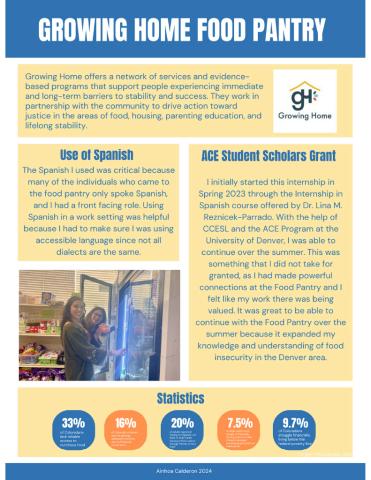
-
8. HOLA Foundation — Aaryn David
Aaryn David, Undergraduate Student, Department of Biology, College of Natural Science and Mathematics
HOLA Foundation — First project website, second project website
I accompanied the non-profit HOLA Foundation (Health Outreach in Latin America), in Nicaragua. There I helped participate and fund things like veterinary clinics and healthcare supplies. The student volunteers like myself participated in spay/neuters, shadowed surgeries, completed wellness checks on pregnant women, and so much more.
Connect further with David.
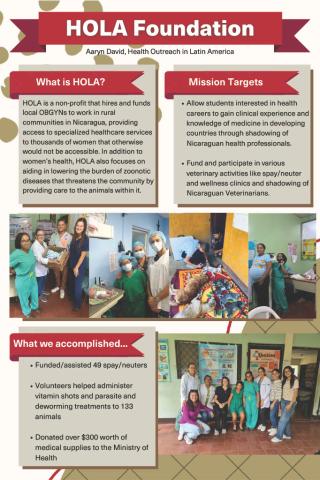
-
9. Reach Within: Transforming Childhood Trauma into Healthy Outcomes — Tenzin Tseten
Tenzin Tseten, Graduate Student, Graduate School of Professional Psychology
Reach Within: Transforming Childhood Trauma into Healthy Outcomes
Reach Within works to break intergenerational cycles of trauma, educate caregivers to foster healthy attachment, and promote resilience and self-regulation in unhoused, trauma-affected youth on the island of Grenada. DU students from the International Disaster Psychology MA program spent 8 weeks working with Reach Within by assisting with weekly rhythmicity groups while also creating individual curriculum around topics like mindfulness and music, therapeutic photography, dance and movement therapy, and gratitude work.
Connect further with Tenzin.
-
10. Snapshot of Confinement — Esteban Gomez
Esteban Gomez, Faculty, Department of Anthropology, College of Arts, Humanities, and Social Sciences
Snapshot of Confinement
How will we remember the past when the generations who experienced it are gone? What will happen to our collective memory when sites of remembrance are erased from the landscape? Those two questions shape Diana Tsuchida’s journey to understand her family’s incarceration experience during World War II by exploring rare photographs, albums and artifacts created by Japanese American families while confined in the camps. Snapshots of Confinement” is a 60-minute feature length film that will focus on the faith, resiliency, and ingenuity of Japanese American families before, during, and after their World War II confinement.
-
11. Teaching Mutual Aid in First-Year Writing — Logan Middleton
Logan Middleton, Faculty, University Writing Program
Teaching Mutual Aid in First-Year Writing
In this poster presentation, I will detail aspects of (attempting to) teach mutual aid in first-year writing. In particular, I highlight an assignment called the Mini Solidarity Campaign, a major assignment that asks students to work collaboratively as an entire class to engage a campus issue in their lives. I also speak to collaborative efforts with mutual aid organizers and researchers across the U.S. and reflect on the limits and challenges of doing mutual aid work in mainstream educational settings.
Connect further with Logan.
-
12. Travelucation - Gamifying sustainable travel (ACE Grant) — Lilith Diringer
Lilith Diringer, Graduate Student, Josef Korbel School of Global and Public Affairs
Travelucation - Gamifying sustainable travel (ACE Grant) — Project website
This project develops a booklet plus simulation material so that children can learn in a playful way how to discover tourist destinations sustainably. Let our kids become Changemakers!
Connect further with Lilith's work: @lilith_power (Instagram) and @Lilith Diringer (Facebook & LinkedIn)
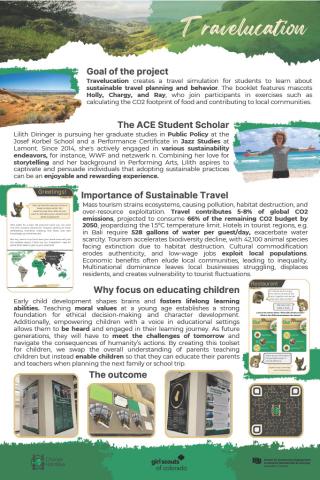
Office for Public Good Programs
----
-
13. Center for Community Engagement to advance Scholarship & Learning
The Center for Community Engagement to advance Scholarship & Learning (CCESL) supports students, faculty, staff, and community partners interested in doing community-engaged work by providing resources and programming that promote far-reaching and sustainable outcomes for the public good.
-
14. Center for Sustainability
Formed as an outgrowth of the Sustainability Council, the Center for Sustainability serves as the campus hub for projects and programs related to the University's efforts toward a more just and sustainable future.
-
15. PLP Leadership Studies Program
PLP is a unique academic minor and Living and Learning Community at the University of Denver that emphasizes leadership ignited by community, curiosity, courage, and action.
-
16. CWC Leadership Scholars Program
A cohort-based Leadership Scholars Program that develops diverse, thoughtful, civically-responsible leaders who thrive at DU and beyond.
-
17. Living and Learning Communities
The LLCs are first and second-year programs that combine academic learning, residential life, and hands-on experiences. Through retreats, individual time with faculty and staff, engaging guest speakers, and opportunities to meaningfully connect with the larger community, these programs deepen your learning and establish lasting friendships.
-
18. Signature Work
On the path to public good discovery, some students carry out signature work, high impact educational experiences that address complex problems.
-
19. Strategic Health Initiative
DU’s Strategic Health Initiative connects, activates, and supports collaboration for research and learning to advance health and wellness.
Digital Works
----
-
Digital Media Literacy for Highschoolers: Designing and Evaluating a Week-long Intervention — Kareem El Damanhoury
Kareem El Damanhoury & David Coppini, Faculty, Department of Media, Film, and Journalism, College of Arts, Humanities, and Social Sciences
Digital Media Literacy for Highschoolers: Designing and Evaluating a Week-long Intervention
This capacity-building project “Digital Media Literacy for High Schoolers: Designing and Evaluating a Week- long Intervention” aimed to develop an extensive digital media literacy class for high school students to equip them with the necessary skills and knowledge needed to verify news claims, identify mis/disinformation, and become critical media consumers. The class was designed in collaboration with high school teachers and professional journalists, build on existing media literacy toolkits and resources, and adhered to the Colorado Department of Education’s (CDE) standards. The class was piloted in Winter 2024 as a one-week course for credit at Crescent View Academy in Aurora. Through a combination of pre- and post-surveys, and student reflection papers, the intervention was evaluated to measure the effectiveness of the digital media literacy class. The lesson plans will be modified accordingly and handed over to the school, CDE, and the state library as four modules to be used in teaching media literacy across the state.
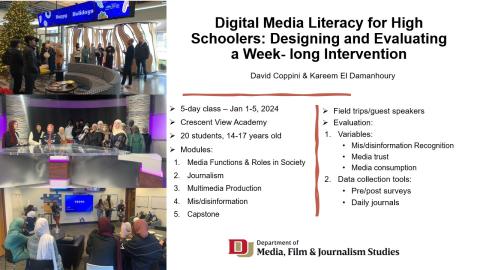
-
Disrupting “Good” vs. “Bad” Person Binaries by Humanizing Victims of Urban Homicide — Reginald Byron
Reginald Byron, Faculty, College of Arts, Humanities, and Social Sciences
Disrupting “Good” vs. “Bad” Person Binaries by Humanizing Victims of Urban Homicide
In 1958, criminologist Marvin Wolfgang coined the term “victim-offender overlap” after finding that most of the murder victims in his study of homicide in Philadelphia had prior arrest records for violent crime and many had engaged in actions that precipitated their murders. Decades worth of criminological research has provided robust statistical evidence for this phenomenon (Berg and Schreck 2022). An unfortunate side effect of these statistics, however, is that when the public perceives a large victim-offender overlap they tend to blame homicide victims for the precipitation of their own murders and then close the book, leaving them apathetic to everyday urban homicides - especially when victims are racial minorities (Mancini and Pickett 2017; Walker, Collingwood, and Bunyasi 2020).
Motivated by Critical Race Theory’s tenet of producing counter-stories, we engaged in a content coding of 280 obituaries of Philadelphia homicide victims (2002-2023) drawn from the Philadelphia Obituary Project. In line with statistics from Philadelphia’s Comptroller’s Office, the obituaries were primarily written to memorialize Black (72%) and Latino (9.4%) men who were young (74% of the sample was 30 years old or younger). Combining these obituaries with local media reports, we call particular attention to the substantial minority of homicide cases (about 15%) where the proximal cause of death is more nuanced than essentialist victim-offender overlap predictions assume (i.e., some victims were trying to be good Samaritans, some were hit by stray bullets while playing sports or as bystanders on a street near a dispute, some were victims of mistaken identity, some were domestic violence victims or co-victims, and others were victims of unprovoked street robberies).
Furthermore, even if most homicide victims do fit typical victim-offender overlap predictions, our project seeks to humanize all of the victims in these data because a longstanding failure to do so only enhances secondary victimization and disenfranchised grief among co-victims (Morris and Scott 2022). We attempt to humanize these victims through a thematic content coding of the victims’ predominant personality characteristics (i.e., caring, comical, and protective) as reported by their loved ones. Then we content code victims’ unrealized aspirations, finding that 19.3% wanted to be business owners (e.g., restaurants and barbershops), 13.2% wanted to be great parents to their young children, and 11.6% wanted to pursue further education. We conclude our analyses by juxtaposing these rich obituary representations with the episodic one-dimensional TV news coverage on these cases and suggest that such deficient media representations help to maintain “good” vs. “bad” person binaries. By working to destigmatize and humanize homicide victims we hope to motivate more privileged citizens to see themselves in these largely Black and Brown victims, sense the tremendous familial and societal loss, and use this interest convergence to support violence prevention policy change.
Connect further with Reginald.
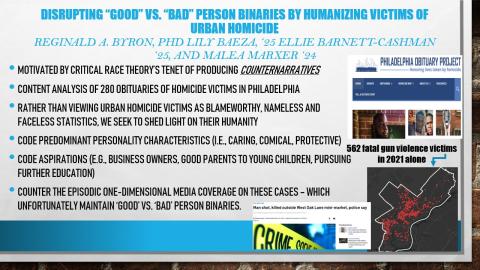
-
DU - Charles Hay Partnership — Sarah Hart Micke
Sarah Hart Micke, University Writing Program
DU - Charles Hay Partnership
For 9 years, Dr. Sarah Hart Micke's WRIT students have been mentoring elementary writers at Charles Hay World School. As students write together in small groups, DU students compose for real-world audiences and encourage Charles Hay students to imagine a future for themselves at college.
Connect further with Sarah.
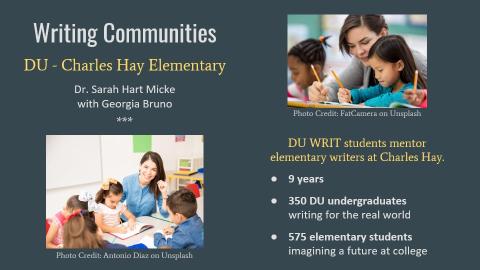
-
Evaluating the Impact of the Friends of the Children of El Salvador on Students' Future Prospects — Pascale Correa-Bruzzese
Pascale Correa-Bruzzese, Undergraduate Student, Josef Korbel School of Global and Public Affairs
Evaluating the Impact of the Friends of the Children of El Salvador on Students' Future Prospects
I did a research project this summer measuring the tangible effect that the Friends of the Children of El Salvador (FOCES) have had on the lives and future prospects of the youths that they work with. This project measured the effect quantitatively and qualitatively by holding interviews with students and by calculating the difference in economic prosperity the students would have with and without a scholarship from FOCES.
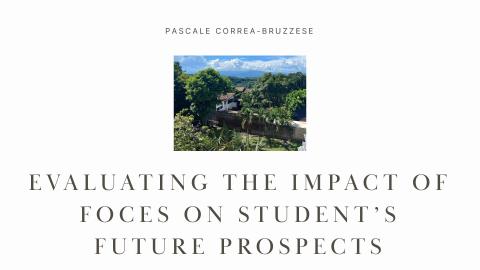
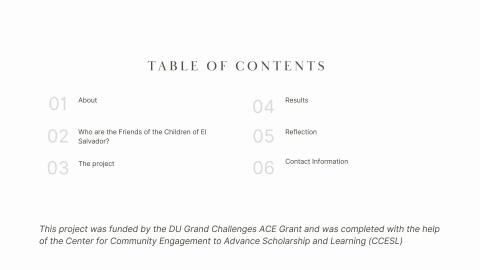
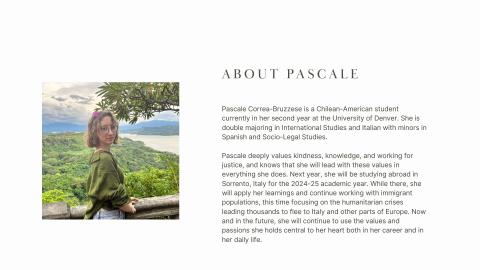
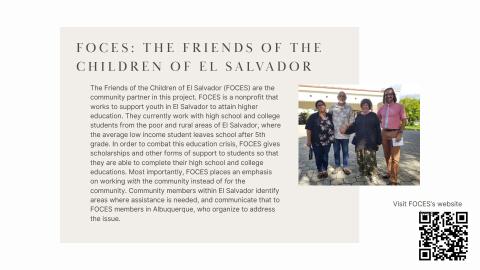
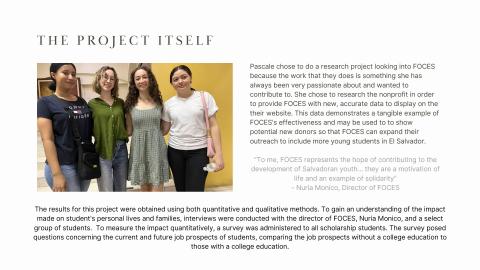
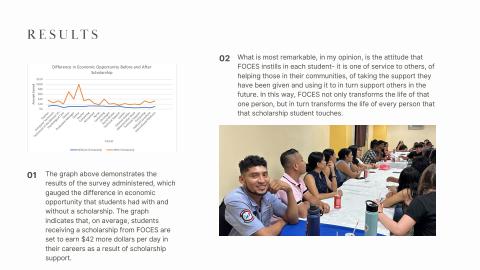
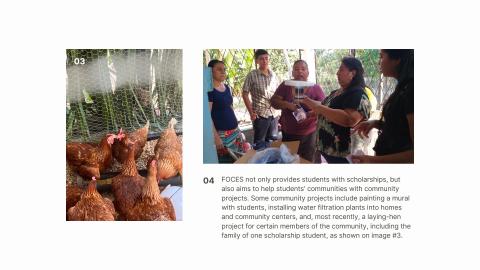
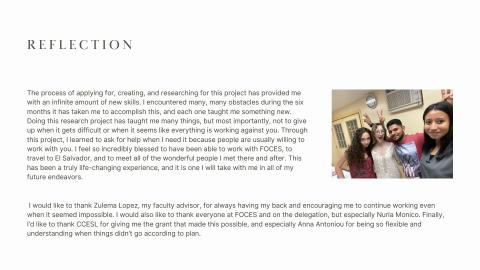
-
Health Outreach for Latin America — Naya Ogbonna-Ukuku
Naya Ogbonna-Ukuku, Undergraduate Student, Department of Biology, College of Natural Sciences and Mathematics
Health Outreach for Latin America
The project involves volunteering with HOLA- Health Outreach for Latin America, a Denver-based nonprofit focusing on healthcare in rural Latin American communities. The trip to Managua, Nicaragua included shadowing local medical professionals, conducting public health work for women, researching to reduce teen pregnancies, and aiding veterinary teams in improving community health.
Connect further with Naya's work: @_naya_uk
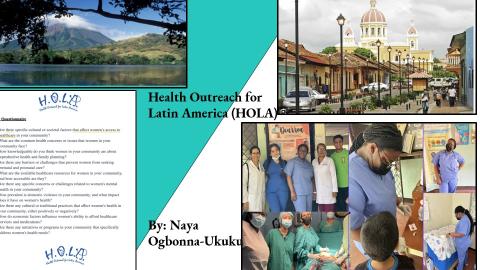
-
In Between Worlds: Indians and the Making of Rhodesia into Zimbabwe — Trishula Patel
Trishula Patel, Faculty, Department of History, College of Arts, Humanities, and Social Sciences
In Between Worlds: Indians and the Making of Rhodesia into Zimbabwe
This book project is a the first history dedicated entirely to the history of Indian migrants and their descendants in the former British colony of Southern Rhodesia, now Zimbabwe. The book makes use of state archives in Zimbabwe, the United Kingdom, India, and the United States, but centers the stories of individuals and families through extensive oral histories and the use of a local community archive in Harare, which I helped create. This work reframes the idea of an African identity as one based on historical and geographical claims to belonging, arguing that the history of Indians in Zimbabwe is an African narrative, not one of an insular and isolated diaspora. By centering the stories and lives of individuals, families, and communities, this book is a social and cultural history of Indians in Southern Rhodesia that explores how they became Zimbabwean.
Connect further with Trishula's work: @trishulapatel
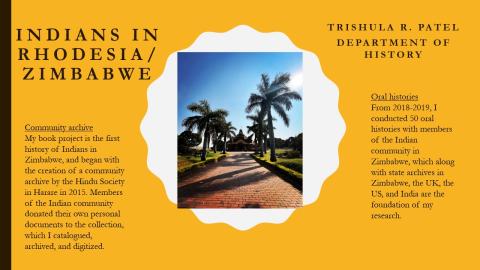
-
STEM Mentorship Program- K-12 Equity Focus — Naichen Zhao
Naichen Zhao, Graduate Student, Morgridge College of Education
STEM Mentorship Program- K-12 Equity Focus
The STEM internship course was initiated, developed and overseen by Dr. Barbekka Hurtt from the Biological Sciences Department. The internship course aims to connect STEM-majored undergrads at DU with high school seniors at the Westminster High School (WHS). DU undergrads met with WHS high school seniors virtually every week and provided 20-30 minutes of mentorship on postsecondary pathways. The focus is particularly on supporting traditionally marginalized students interested in STEM, helping them grow in confidence and knowledge as they pursue STEM possibilities after graduation. Mentorship topics are STEM-focused and cover areas such as college applications, scholarships, college life, and professional development. Naichen Zhao, the CCESL community-engagement fellow, has been supporting the internship course since Fall 2022.
Connect further with Naichen's work: @naichenzhao (Instagram), @leiouxiaowang (Twitter), and @NaichenZhao (Facebook)
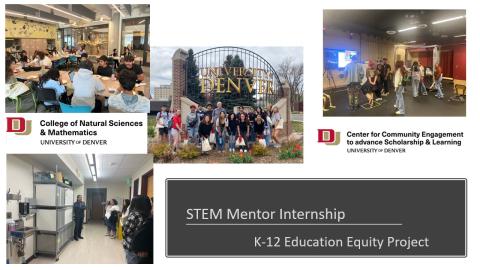
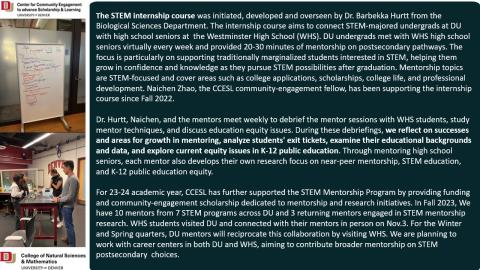
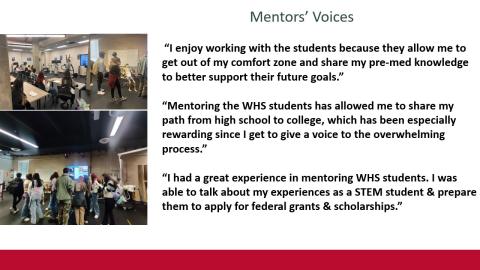
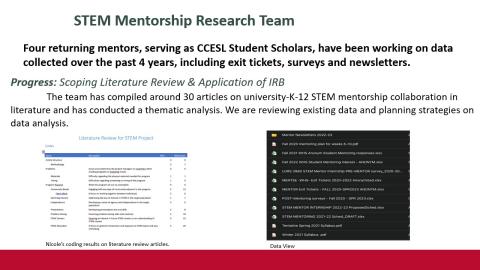
-
Writers in the Schools — Kelly Krumrie
Kelly Krumrie, Faculty, Department of English, College of Arts, Humanities, and Social Sciences
Writers in the Schools
Writers in the Schools places writer-mentors in K-12 classrooms in order to develop and facilitate creative writing programming. In Winter and Spring of 2023, DU undergraduate and graduate students worked with partner teachers at the Ricks Center to give creative writing lessons to third, sixth, and seventh graders.
The DU students also made a print anthology of the children’s poetry.
Connect further with Kelly's work: @syntacticon
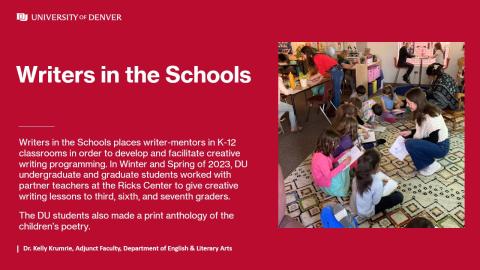
-
Iterative Development and Implementation of the Benevolent Childhood Experiences (BCEs) Scale with Community Health Providers — Angela Narayan, Ph.D., L.P.
Angela Narayan Ph.D., L.P., Faculty, Department of Psychology, College of Arts, Humanities, and Social Sciences
Iterative Development and Implementation of the Benevolent Childhood Experiences (BCEs) Scale with Community Health Providers — View Project
The Benevolent Childhood Experiences (BCEs) scale is a tool that can be directly implemented into community health and research settings. The BCEs scale assesses positive childhood experiences as promotive and protective factors in adults and parents with histories of childhood adversity as strategies to harness adults’ and parents’ resilience factors for their psychological resilience, effective parenting strategies, and positive experiences and relationships with their own children. The BCEs scale was developed to be used as a counterpart to the well-known ACEs scale to leverage resilience processes in diverse and marginalized families, as well as pregnant individuals and partners/non-birthing parents, to promote wellbeing across generations. This specific project aimed to work with community and health-related stakeholders to iteratively develop an expanded BCEs scale of 20 items for more comprehensive and targeted use in community health and research settings.
Connect further with Angela's work: @angelajnarayan (Twitter) and @angelajn (Facebook and Instagram)
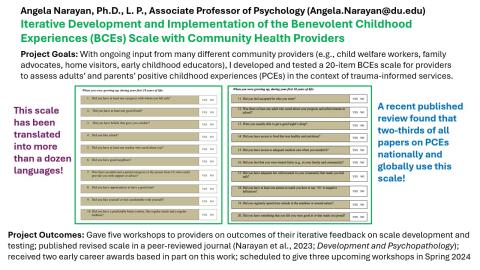
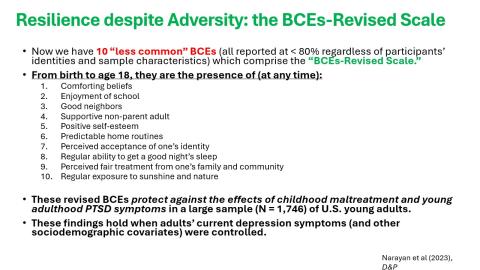
-
STEMming the Future — Samantha Rodriguez
Samantha Rodriguez, Undergraduate Student, College of Arts, Humanities, and Social Sciences
STEMming the Future
As part of my project, I have been part of the STEM mentoring program in collaboration with Westminster students. This program allows high school students to explore different career paths within the STEM field, hoping to stem them into a bright future. This allows students to know that there are endless possibilities once they leave high school, and it encourages students to choose a 4-year college track but it also provides opportunities to possible trade schools and other work that does not require a 4-year degree. This program is to have students have faith in their capabilities and know they are supported by students like us here at DU. These students are future leaders and have the great privilege of exploring futures to better themselves and the world.
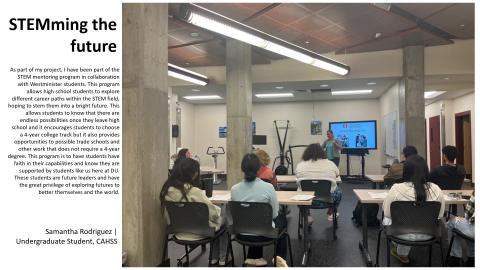
-
Transforming the Paradigm of Aging: Community Engaged Learning and Critical Interpersonal and Family Communication Pedagogy - Elizabeth Suter
Elizabeth Suter, Faculty, Communication Studies Department, College of Arts, Humanities, and Social Sciences
Transforming the Paradigm of Aging: Community Engaged Learning and Critical Interpersonal and Family Communication Pedagogy
This term-long community engaged project was developed for the Communication Studies Undergraduate Capstone Course, Family Discourses, Power, & Culture. The collaborators are Elizabeth A. Suter, Professor, Department of Communication Studies and Tanya Matthias, Program Director, A Little Help, Denver, Colorado. A Little Help is a community-based, local non-profit organization, or “Village,” part of the national Village Movement. The Village Movement supports grassroots organizing to enable seniors to remain in their homes. Villages foster improved population health by reducing isolationism, increasing relational interdependence, and enhanced purpose of living for elderly aging independently in their homes. This project has been invited to be featured in a forthcoming edited collection for interpersonal and family communication faculty thinking about creative and constructive ways to integrate critical concepts into their pedagogy, such as social justice, power, and culture. This project offers a critical discursive community-engaged project relevant for several courses, including, but not limited to: Interpersonal Communication, Relational Communication, Intergenerational Communication, Communication across the Life Course, Family Communication, Health Communication. Its learning objectives include: a) increasing student knowledge about interrelationships among stigmatizing cultural discourses (i.e., ageism), population health outcomes, and intergenerational interpersonal interactions; b) engendering student interest in countering ageism to promote community-building, intergenerational relationship building, and positive population health outcomes (e.g., reduced isolationism and increased interdependence of aging community members).
Connect further with Elizabeth.
-
Spanish Outreach and Local Politics — Mina Khadem
Mina Khadem, Student, Spanish Department, College of Arts, Humanities, & Social Sciences
Spanish Outreach and Local Politics — View Project
For the Spring 2023 quarter I was part of a Spanish Internship class and worked very closely with the Colorado Democratic Party. I worked mostly with the party's Spanish outreach, informative, and social media efforts. This included contacting and working with Spanish-speaking media (radio, newspapers, and magazines), creating informative content to communicate important voting information—like the municipal elections—, and translating and creating social media content. I was fortunate to continue my work with the party over the summer due to support from the 2023 DU Grand Challenge ACE Student Scholar Grant and CCESL. Over the summer, I worked closely with prominent Latino groups such as the Colorado Latino Initiative, helped establish the Horizon's Project, and organized voter outreach initiatives to Spanish-speaking communities across Colorado. I also had the opportunity to design booth activities for the Colorado Democratic Party's events. I am very grateful for my experience with the party and the efforts towards improving its relationship with the Latino and Spanish-speaking community here in Colorado. I have learned a lot about the complex dynamics between local politics and language. It is clear that regardless of one's political affiliation, bettering connections with communities that do not traditionally speak English as their first language should be prioritized. The voices of these communities, which have historically been underrepresented, must be better represented in our democratic processes.
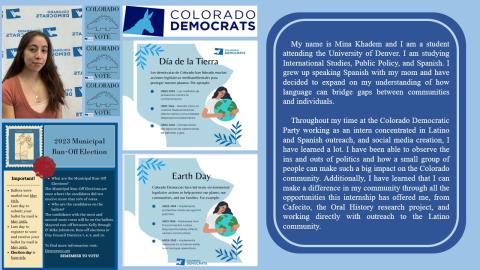
-
Networking Rural Research-Practice Partnerships: An Exploratory Study — Kristina Hesbol
Kristina Hesbol, Faculty, Associate Professor, Educational Leadership and Policy Studies/Morgridge College of Education
Networking Rural Research-Practice Partnerships: An Exploratory Study — View Project
This project studies the leadership that co-constructed innovative alternatives to standardized testing in several rural school districts. Our Center for Innovative Rural Collaborative Leadership Education (CIRCLE) is developing a Practice-Research Partnership (PRP) with these districts. We're making site visits to interview rural superintendents, members of the Rural Innovative Educators Project (RIEP*), in an effort to identify attitudes and practices that support the diffusion of innovation at their district and across other rural sites, as well as to study how, if at all, innovation accelerates within their NIC. Each site has empirical evidence that the evidence (compiled and analyzed by CIRCLE) from the alternative assessments is informing instructional, operational, and policy decisions in their school district.
Connect further with Kristina's work: @khesbol (Twitter, Facebook, Instagram)
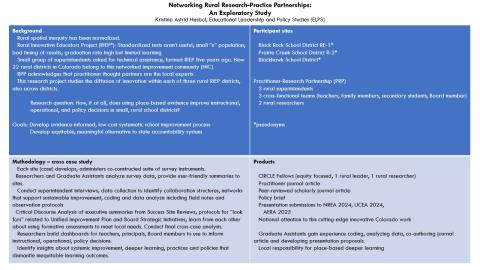
-
Our Stories, Our Medicine Archive Project — Ramona Beltran, Miriam Valdovinos, Azucena Pacheco, Zean Dunbar, My Ngoc To, Tina Hulama, & Olivia Hunte
Ramona Beltran (Faculty) with Miriam Valdovinos (Co-Investigator), Azucena Pacheco (Post-Doctoral fellow), Zean Dunbar, My Ngoc To, Tina Hulama, and Olivia Hunte (PhD students)
Our Stories, Our Medicine Archive Project — Project not yet digitally available
Our Stories, Our Medicine Archive (OSOMA) is a community-based, community-owned archive which foregrounds traditional Indigenous health knowledge and their implications for improving chronic diseases. At its core, OSOMA is designed to create an archive that centers traditional Indigenous knowledge in construction and management of cultural artifacts, genealogy, and health information.
Connect further with Ramona's work: profe_ramona (Instagram) and @Ramona Beltran (Facebook)
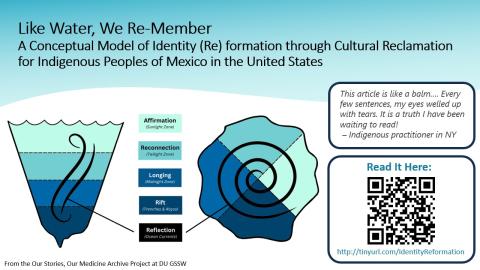
-
Indigenous Youth RiseUp! A Culture-Centered HIV Prevention Program for Indigenous Youth — Ramona Beltran & Olivia Hunte
Ramona Beltran (Faculty) & Olivia Hunte (PhD student)
Indigenous Youth RiseUp! A Culture-Centered HIV Prevention Program for Indigenous Youth — Project not yet digitally available
The purpose of this project was to expand the annual Rise Up! HIV/AIDS prevention efforts by developing and evaluating a culture-centered HIV/AIDS prevention curriculum for Indigenous youth. The curriculum goals were to increase knowledge and decrease HIV risk behaviors and stigma among Indigenous youth. The evaluation included pre- and post-test surveys as well as individual interviews with all participating youth. A Medicine Wheel framework informed the design of the curriculum used in this project. All of the educational modules used culture-centered experiential education strategies to indigenize HIV harm reduction approaches.
Connect further with Ramona's work: profe_ramona (Instagram) and @Ramona Beltran (Facebook)
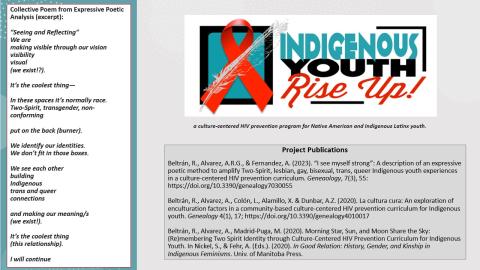
-
Voice of Children (VOC): Building Resilient Futures through Community and Advocacy — Gina Severin
Gina Severin, Graduate Student, Graduate School of Professional Psychology
Voice of Children (VOC): Building Resilient Futures through Community and Advocacy — View Project
Voice of Children (VOC) implements a comprehensive program for street and sexually abused children in Nepal. Using the Ladder Methodology, the project aims to transition these children from street life to family or community environments by enhancing life skills and societal adaptability. VOC focuses on strengthening children's development at each step, promoting sustainability and growth within a family setting. Additionally, the organization works to prevent the rise in street children by empowering vulnerable urban families, raising awareness, and providing support to protect children from sexual abuse.
